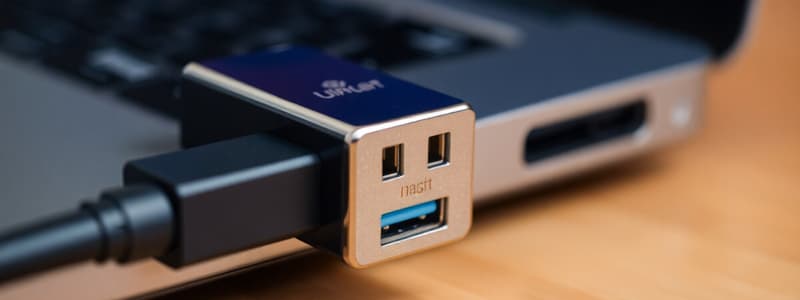Podcast
Questions and Answers
What is the maximum speed of USB 1.1 in its full speed version?
What is the maximum speed of USB 1.1 in its full speed version?
Which USB version introduced a maximum speed of 480 megabits per second?
Which USB version introduced a maximum speed of 480 megabits per second?
What new feature does the USB-C connector have compared to earlier USB connectors?
What new feature does the USB-C connector have compared to earlier USB connectors?
Which of the following USB connectors is typically used for mobile devices?
Which of the following USB connectors is typically used for mobile devices?
Signup and view all the answers
How does the USB 3.0 standard affect the connectors compared to USB 2.0?
How does the USB 3.0 standard affect the connectors compared to USB 2.0?
Signup and view all the answers
What was the maximum cable length for the low-speed USB 1.1 connection?
What was the maximum cable length for the low-speed USB 1.1 connection?
Signup and view all the answers
Which USB version is often referred to as super speed USB?
Which USB version is often referred to as super speed USB?
Signup and view all the answers
What is the maximum speed associated with USB 3.0?
What is the maximum speed associated with USB 3.0?
Signup and view all the answers
What is the maximum speed of USB 3.1 Gen 1?
What is the maximum speed of USB 3.1 Gen 1?
Signup and view all the answers
Which USB standard is correctly matched with its maximum throughput?
Which USB standard is correctly matched with its maximum throughput?
Signup and view all the answers
What is the difference in maximum throughput between USB 3.1 Gen 1 and USB 3.1 Gen 2?
What is the difference in maximum throughput between USB 3.1 Gen 1 and USB 3.1 Gen 2?
Signup and view all the answers
What does Thunderbolt version 3 utilize for its connections?
What does Thunderbolt version 3 utilize for its connections?
Signup and view all the answers
How many devices can be daisy chained using Thunderbolt connections?
How many devices can be daisy chained using Thunderbolt connections?
Signup and view all the answers
Which standard provides the highest maximum throughput based on the information provided?
Which standard provides the highest maximum throughput based on the information provided?
Signup and view all the answers
What cable length is maximum for copper connections in Thunderbolt?
What cable length is maximum for copper connections in Thunderbolt?
Signup and view all the answers
What was the original purpose of RS-232 signals commonly associated with 9-pin and 25-pin connections?
What was the original purpose of RS-232 signals commonly associated with 9-pin and 25-pin connections?
Signup and view all the answers
Which naming convention corresponds to USB 3.2 Gen 2?
Which naming convention corresponds to USB 3.2 Gen 2?
Signup and view all the answers
What is the main characteristic of the USB 3.2 standard compared to earlier USB versions?
What is the main characteristic of the USB 3.2 standard compared to earlier USB versions?
Signup and view all the answers
Study Notes
USB Connection Standards
-
USB 1.1 had two speeds: low (1.5 Mbps, 3 meters max cable) and full (12 Mbps, 5 meters max cable)
-
USB 2.0 increased max speed to 480 Mbps (5 meters max cable)
-
USB 3.0 (super speed): 5 Gbps (3 meters, unspecified max)
- Different connectors from previous versions (Standard-A, Standard-B, mini-B, micro-B)
- Standard-B and micro-B connectors have different designs for improved signal transmission capabilities.
-
USB-C connector:
- Connects the device regardless of orientation
- Supports various signals (not just data; video, etc.)
- Smaller than micro-B, symmetrical for easy plugging
-
USB 3.1 Gen 1 (formerly USB 3.0): 5 Gbps, Renamed
-
USB 3.1 Gen 2 (formerly USB 3.1): 10 Gbps, Renamed
-
USB 3.2 Gen 1 (formerly USB 3.1 Gen 1): 5 Gbps, Renamed
-
USB 3.2 Gen 2 (formerly USB 3.1 Gen 2): 10 Gbps, Renamed
-
USB 3.2 Gen 2x2: 20 Gbps (Double the 10 Gbps lanes)
Thunderbolt Connections
- High-speed serial connections that carry data and power on the same cable
- Thunderbolt 1: 2 channels at 10 Gbps each (20 Gbps total throughput)
- Thunderbolt 2: Aggregates channels for 20 Gbps throughput
- Thunderbolt 3: Uses USB-C connector, supporting 40 Gbps
- Supports copper cables (up to 3 meters) and fiber cables (60 meters).
- daisy-chaining up to 6 devices for connection extension via additional cables
Serial Connections (pre-USB)
- Pre-USB devices used 9-pin and 25-pin serial connections
- RS-232 signals for serial communication with devices like modems
- DB-9 and DB-25 connectors are still common
- Used for configuring devices like switches, routers, or firewalls via command lines.
Studying That Suits You
Use AI to generate personalized quizzes and flashcards to suit your learning preferences.
Description
This quiz covers the various USB connection standards, including USB 1.1, 2.0, 3.0, and the innovative USB-C technology. Additionally, it touches on Thunderbolt connections, highlighting their high-speed capabilities and data transmission features. Test your knowledge on these essential connectivity technologies!



